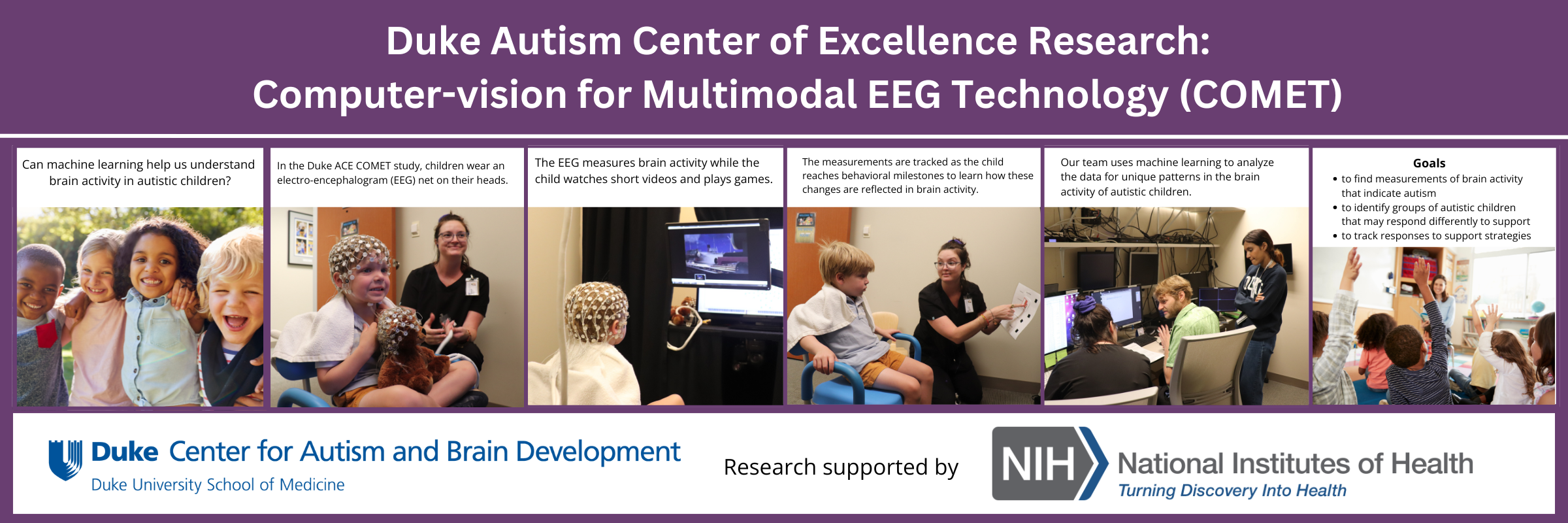
The SenseToKnow STAR Study
 The goals of this study are to use advanced technologies, such as computer vision, to improve our ability to detect autism early in life and to monitor whether children are making progress in response to early interventions. We also seek to develop better ways of supporting primary care pediatricians in their delivery of care to children with a diagnosis of autism. Duke patients who are between 16-36 months of age may be eligible for this study.
The goals of this study are to use advanced technologies, such as computer vision, to improve our ability to detect autism early in life and to monitor whether children are making progress in response to early interventions. We also seek to develop better ways of supporting primary care pediatricians in their delivery of care to children with a diagnosis of autism. Duke patients who are between 16-36 months of age may be eligible for this study.
- Assess the accuracy of a remotely delivered at-home app for autism detection at 16-30 months
- Understand whether the app can help monitor changes in children's behavior over time
- Explore the feasibility of using computer vision analysis to measure patterns of parent-child interactions
- Design and assess automated clinical decision support for pediatricians to assist in autism screening, connect families with services, and address co-occurring medical conditions

Using Electronic Health Records to Screen for Autism Study
 The goals of this study are to develop objective ways of identifying infants and toddlers who have a higher likelihood of a later diagnosis based on their patterns of healthcare use (electronic health records) and to better understand the medical conditions that are associated with autism early in life.
The goals of this study are to develop objective ways of identifying infants and toddlers who have a higher likelihood of a later diagnosis based on their patterns of healthcare use (electronic health records) and to better understand the medical conditions that are associated with autism early in life.
- Develop and validate a generalizable, off-the-shelf model using children's electronic health records to predict autism for use at 18 months
- Design and assess the usability of clinical decision support for pediatricians for autism screening, connecting families with services, and addressing co-occurring medical conditions
- Describe the nature and prevalence of early medical conditions among children later diagnosed with autism and their association with the later development of psychiatric conditions

The COMET Study
 The goals of the study are the develop objective brain-based methods for identifying autism that can improve early detection and be used to evaluate interventions designed to improve brain function in autism. Children diagnosed with autism (or suspected) and children without a diagnosis of autism between 3-5 years of age may be eligible for this study.
The goals of the study are the develop objective brain-based methods for identifying autism that can improve early detection and be used to evaluate interventions designed to improve brain function in autism. Children diagnosed with autism (or suspected) and children without a diagnosis of autism between 3-5 years of age may be eligible for this study.
- Evaluate novel brain-based biomarkers in autistic and neurotypical children
- Develop new ways of understanding brain function in autism
- Evaluate whether autistic children who have an intellectual disability have a different pattern of brain function than those who do not have an intellectual disability.
